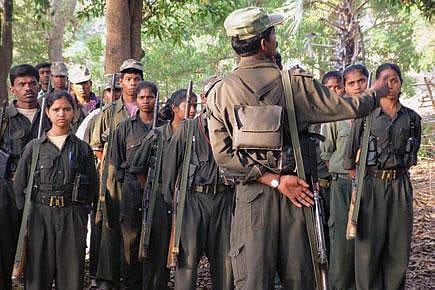Adrift in Andhra

Maoists know the importance of the state. Could the same be said of the Centre?
In its fight against India's Maoists, the Centre has always cited Andhra Pradesh as a success story. After all, the Maoist cadres were almost completely wiped out from the state that was one of their strongholds till a few years ago. But now, alarm bells are ringing once again. Recently, Maoists struck in the state after a gap of four years, killing two men—a political leader and a former Maoist. The police have reason to believe that Maoists are planning a comeback, and this time it will be followed by operations on a much bigger scale. The Centre is already planning massive troop deployment in this area, but on account of fear, night bus services in areas like Vishakhapatnam, Khammam, Adilabad, Karimnagar and Warangal have already been discontinued. Intelligence reports suggest that Maoists are planning major strikes in their erstwhile bastion. One of the senior Maoist leaders, Ramakrishna, is believed to be directing operations in this area. In an exclusive interview last year to Open, Maoist supreme commander Ganapathi had made clear his party's future plans for Andhra Pradesh. "The objective conditions in which our revolution began in Andhra Pradesh have not undergone any basic change. This very fact continues to serve as the basis for the growth and intensification of our movement. Moreover, we now have a more consolidated mass base, a relatively better-trained people's guerilla army and an all-India party with deep roots among the basic classes who comprise the backbone of our revolution."
A recent survey poll done by The Times of India in five districts of Telangana region also confirms what Ganapathi termed as 'objective conditions'. In Warangal, 81 per cent respondents said that the root cause of disaffection is the overwhelming feeling of neglect of these areas by the government. Almost 60 per cent said that Naxalites were good for the area. And 50 per cent also said that Naxalites had forced the government to focus on development work in the affected areas.
The problem is that Maoists, not only in Andhra but even elsewhere, have always gained most of their strength during times of political instability. And right now, Andhra Pradesh is perhaps going through one of its most unstable political periods. After YSR's death, a political vacuum ensued that Congress tried to fill by putting K Rosaiah on the Chief Minister's seat. But his position was challenged by YSR's son Jagan Reddy. In Telangana, a crisis is already brewing. The Srikrishna Committee, constituted to look at the demand for a separate Telangana state, is believed to have kept its report very subtle, not arriving at any concrete conclusion over the demand. On the issue of the Polavaram dam in the East Godavari region, Maoists have been able to mobilise local tribals. Despite repeated intelligence inputs suggesting that Maoists are trying to take advantage of the unrest, like they reportedly did in Singur and Nandigram, the Government has so far failed to react. Also, once an area is wrested out of Naxal control, as is the case with areas in Andhra Pradesh, police action has to be succeeded by development work such as the building of roads, creating health infrastructure and generating employment. But in the current scenario of political instability, development is the last thing on anybody's mind. That no such development has taken place in this area emerges quite clearly from the Telangana survey.
2026 Forecast
09 Jan 2026 - Vol 04 | Issue 53
What to read and watch this year
On the issue of Telangana, Andhra's ruling Congress party has changed its opinion many times, enabling Maoists and their sympathisers to generate political opinion in their favour. The police believe that the large-scale violence that was part of the Telangana agitation was mostly led by students and activists sympathetic to the Maoist cause. Even on the Jagan Reddy issue, the party failed to act on time, only harming itself in the process.
There have been many examples in the recent history of India where it is clear that such political dithering and indecision has cost us dear. Punjab, and more recently Manipur and Kashmir, are glaring examples of how things can go out of hand fast if the Government fails to respond decisively. The Centre must realise that in its war against Maoists, who controls Andhra will at the end make all the difference. Maoists know this very well. The question is: does the Government realise what is at stake in that state?
